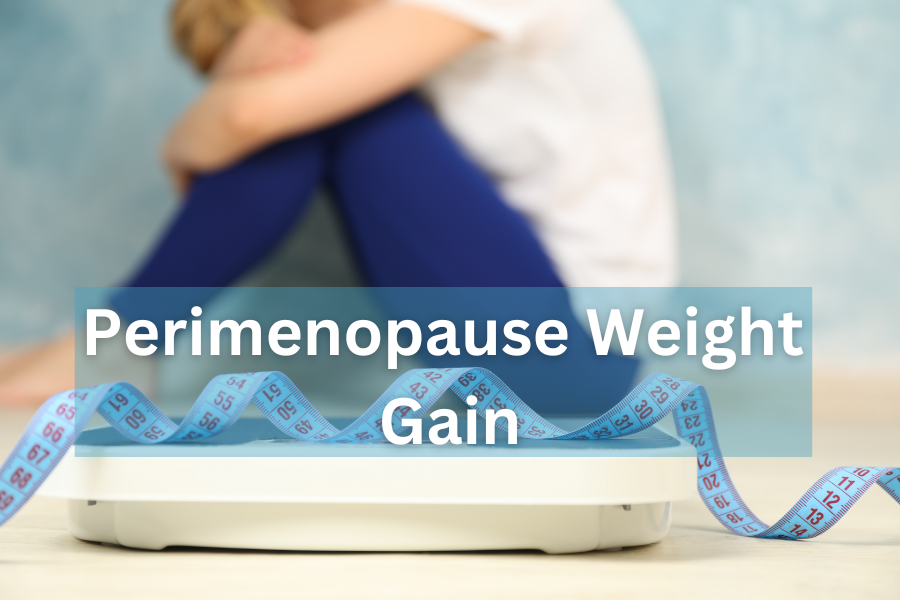In this blog post, we will explore the factors contributing to perimenopause weight gain. We also discuss effective strategies to manage and maintain a healthy weight during this phase of life.
Perimenopause is a transitional stage that women go through before entering menopause, typically starting in their 40s. During this time, many women experience various physical, hormonal and emotional changes that can lead to various symptoms, including weight gain.
Let’s explore some of the causes of perimenopause weight gain and some tips to help you navigate this transitional time in your life.
Understanding the Causes of Perimenopause Weight Gain
Perimenopause weight gain – Hormonal changes
One of the increasing causes of obesity is weight gain related to imbalanced hormones, primarily estrogen and progesterone. When they are not balanced, it can lead to weight gain, particularly around the abdomen, where it is the hardest to get rid of.
Low progesterone can be an indication of estrogen dominance. It is important for estrogen and progesterone to be balanced. When estrogen levels are abnormally high, it can make progesterone appear low, and therefore contribute to weight gain due to that increase in estrogen levels.
Estrogen is responsible for depositing more fat onto different areas of your body. If estrogen remains high, compared to progesterone in an unbalanced system, you would retain more fat cells than you normally would. This can make it more difficult to maintain a healthy weight and fat distribution.
Perimenopause weight gain – Metabolism slowdown
As women age, their metabolism naturally slows down, making it easier to gain weight and harder to lose it.
Women report an increase in appetite and cravings due to hormonal fluctuations. Progesterone rises after ovulation which boosts your metabolism and increases your appetite. This could cause you to eat more during this stage of your cycle.
Healthy levels of progesterone also support the thyroid. The thyroid produces the hormones that regulate your metabolism. When thyroid function slows down due to unbalanced hormones, your metabolism will slow down and you will burn less calories.
Perimenopause weight gain – Muscle loss
Perimenopause often coincides with a gradual loss of muscle mass, which can decrease the body’s ability to burn calories efficiently.
Muscle and bone loss happens more dramatically as women lose estrogen during perimenopause. Muscle loss happens the most during the first five years of perimenopause.
Some women report shifts in body composition, specifically fat distribution, particularly around the abdomen. Reduced estrogen increases visceral fat, the fat around your organs. The hunger hormone, ghrelin, increases and insulin resistance increases as estrogen decreases.
Perimenopause weight gain – Collagen loss
Women also lose collagen pretty rapidly in the first five years of perimenopause. The risk for injury is increased, due to collagen loss.
Some additional factors that can contribute to perimenopause weight gain include; age and genetic predisposition; lifestyle choices including diet and physical activity levels; stress and its effect on weight regulation.
Tips to Manage Perimenopause Weight Gain
You can help manage your perimenopause weight gain and symptoms by focusing on the strategies listed below. Keep in mind, every individual is different. Experiment with a combination of these tips to see what works best for you and your symptoms.
Balanced diet
Adopting a balanced diet rich in nutrient-dense foods is crucial to combatting weight gain during perimenopause. These foods include fruits, vegetables, lean proteins, and whole grains.
Ensure you get enough fiber in your diet: 35 grams per day is recommended. Fiber is important because it helps prevent you from reabsorbing the excess hormones your body is trying to get rid of. If the excess hormones are reabsorbed, they may create further imbalances and make estrogen dominance worse.
Fiber
Fiber also helps regulate blood sugar and insulin levels. When sugar is regulated, it supports hormone health.
You typically need 5 – 10 servings of vegetables a day. Add whole fruits and vegetables to every meal and snack.
Avoid white flour, and foods made from white flour, and sugar. Choose whole grains, brown rice, and beans. A good rule of thumb is to make sure you are eating 1 gram of fiber for every 10 grams of carbohydrates on the food label. The closer the numbers of fiber and carbohydrates are together, the better.
Fiber rich foods include:
Chia Seeds – 1 ounce equals 10 grams of fiber
Flaxseed – 1 ounce equals 8 grams of fiber
Pumpkin Seeds – 1 ounce equals 5 grams of fiber
Green Peas, frozen – 1 cup equals 6 grams of fiber
Lentils, cooked – 1 cup equals 16 grams of fiber
Pinto Beans, cooked – 1 cup equals 15 grams of fiber
Blackberries – 1 cup equals 8 grams of fiber
Raspberries – 1 cup equals 8 grams of fiber
Avocado – medium size,1/3 equals 3 grams of fiber
Pear with skin – medium size, equals 5 grams of fiber
Acorn Squash, cooked – 1 cup equals 9 grams of fiber
Cauliflower, cooked – 1 cup equals 5 grams of fiber
Brussel Sprouts, cooked – 1 cup equals 4 grams of fiber
Spinach, cooked – 1 cup equals 4 grams of fiber
Sugar
Reducing or even avoiding processed and sugary foods can help manage weight gain during perimenopause. Try to keep your sugar intake to less than 20 grams of added sugar per day.
Hydration
Staying hydrated can help support metabolism and control cravings. Aim for half your body weight in ounces of water daily.
Alcohol
Limiting alcohol consumption is also important in combatting perimenopause weight gain. It’s best to either avoid alcohol or keep it to less than 2-4 drinks per week.
Take a Deeper Dive into your metabolism- and how you can boost it
The Lumen tells you how to adjust your nutrition plan based on your body’s actual needs. Metabolic flexibility is the ability of the human body to switch back and forth between fat and carbohydrates based on their availability.
Your metabolism can be improved, just like your body gets stronger and fitter from working out.
Improving your metabolic efficiency leads to:
Natural weight loss – Lumen helps improve your metabolic flexibility, allowing you to lose weight sustainably.
Less snacking – Lumen helps you improve your body’s ability to burn fat, decreasing your hunger levels and making your body less dependent on snacking.
Energy and Mood boost – Increase your energy levels by developing a high-functioning metabolism.
Improved overall health-Lumen helps you improve your metabolic flexibility and your body’s efficiency in shifting between using fats and carbohydrates.
Enhanced weight maintenance-Developing a flexible metabolism allows your body to maintain a healthy weight by optimizing its ability to burn fat.
Get yours here and save 15%! Use DRMEYER as a discount code: https://www.lumen.me/shop?fid=9761&utm_source=influencer&utm_medium=influencer&discount=DRMEYER
Start tracking your food
There are many apps out there that can help you reach your daily goals, like MyFitnessPal. These apps can help you set goals, track things like fiber and vegetable intake, and see how you are doing with these goals.
Starting out small and working your way up can help you show frequent wins, which can help if you get discouraged by not meeting goals. Tracking seems like a monotonous process, but it can make a huge difference in understanding how much or how little of what you are actually eating, including fiber.
I also like Carb Manager, as it tracks all your macros (carbs, protein, fat) as well as fiber. Both of these apps offer free and premium versions. I prefer the premium version of Carb Manager, as it offers a multitude of recipes and advanced tracking and even includes a very detailed analysis of vitamins, minerals, and fatty acids.
Regular exercise
Engaging in regular physical activities, preferably a combination of cardiovascular exercises (such as brisk walking or cycling) and strength training can boost metabolism, maintain muscle mass, and promote weight management.
Strength training can also help counteract muscle loss. You can start small- 10 minutes of walking, cycling, or even strength training, after meals can be super helpful in boosting metabolism.
Overall goals to work up exercise are:
- Cardiovascular exercise- 20-30 minutes 5-7 days per week
- Strength Training or Circuit Training- 20-30 minutes 2-3 days per week
- Yoga and/or Pilates- Yoga and/or Pilates can be a great way to build muscle and also incorporate mindfulness (yoga more so than pilates), which can help lower stress and improve sleep in perimenopause. You could substitute yoga or pilates sessions for one or two of your strength or cardiovascular sessions.
Stress management
High stress levels can contribute to weight gain. Finding effective ways to manage stress, such as through relaxation techniques like meditation or engaging in hobbies, can prevent emotional eating and weight gain.
Incorporating stress reduction techniques like yoga, meditation, or deep breathing exercises can be beneficial.
Therapy can also help to manage stress if needed.
One of my favorite tools for stress management and mindfulness is the Aura app. This app has guided meditation and deep breathing sessions, as well as life coaching and cognitive behavioral therapy mini-courses. Try it free for 7 days and/or get 25% off a premium version with this link!
Other wonderful mindfulness apps are:
- Calm
- Headspace
- InSight Timer
Quality sleep
Adequate sleep regulates hormones. Prioritize getting enough sleep, as lack of sleep can disrupt hormones and contribute to weight gain.
Turning off blue-screen devices two hours before you go to bed can help you achieve a deeper, more restful and restorative sleep. A great goal is to get 7 to 9 hours of sleep.
Melatonin can also be helpful as we tend to lose our natural melatonin levels gradually in perimenopause, and more so after menopause. Magnesium can be supportive of healthy sleep too, and can help reduce stress and anxiety. Many women are deficient in magnesium.
Sleep can be very challenging in perimenopause, as rollercoaster like estrogen levels, and gradual declining progesterone, can greatly impact a woman’s ability to sleep. Check out our other videos and blogs on perimenopause solutions and supplements that can help regulate your hormones and help you sleep!
Hormone therapy
In some cases, hormone replacement therapy (HRT) may be recommended to manage symptoms related to perimenopause weight gain. Consult with a healthcare professional to discuss the potential benefits and risks of hormone therapy. Hormone replacement therapy may help alleviate perimenopause symptoms, including weight gain.
In addition, there are some supplements like berberine, dim, or maca that can help regulate perimenopause induced weight gain. Check out one of the most popular supplements for perimenopause, Hormone Harmony. I also love femguard balance.
Seek Support and Professional Guidance
Some helpful resources and providers for weight management in perimenopause could include:
- A Functional Medicine Provider or Integrative Healthcare Practitioner
- A Registered Dietitian or Nutritionist who specializes in perimenopause and hormone imbalance
- An online or in person supportive community- one example is Perry; though they don’t focus specifically on weight management, the support is fantastic, and they have so many women there to share your experiences with and learn from!
Conclusion
Perimenopause weight gain can be frustrating, but it is a normal part of the aging process for many women. By understanding the factors contributing to weight gain during this stage, and implementing healthy lifestyle changes, women can effectively manage their weight and maintain overall well-being during perimenopause. Each individual may have unique experiences and needs, so it’s important to consult with healthcare professionals for personalized advice. Remember, every woman’s journey is unique, so be patient and kind to yourself throughout this transitional phase.
You may also like SOME OF THESE POSTS AND VIDEOS:

Dr. Shelley Meyer is a board-certified family physician and Institute of Functional Medicine-certified functional medicine physician, as well as a Registered Dietitian. She is passionate about helping women navigate the roller coaster of perimenopause and postmenopause. She has her own Functional Medicine Practice in Denver, Colorado.








[…] Perimenopause Weight Gain – Including 5 Tips to Manage Symptoms […]